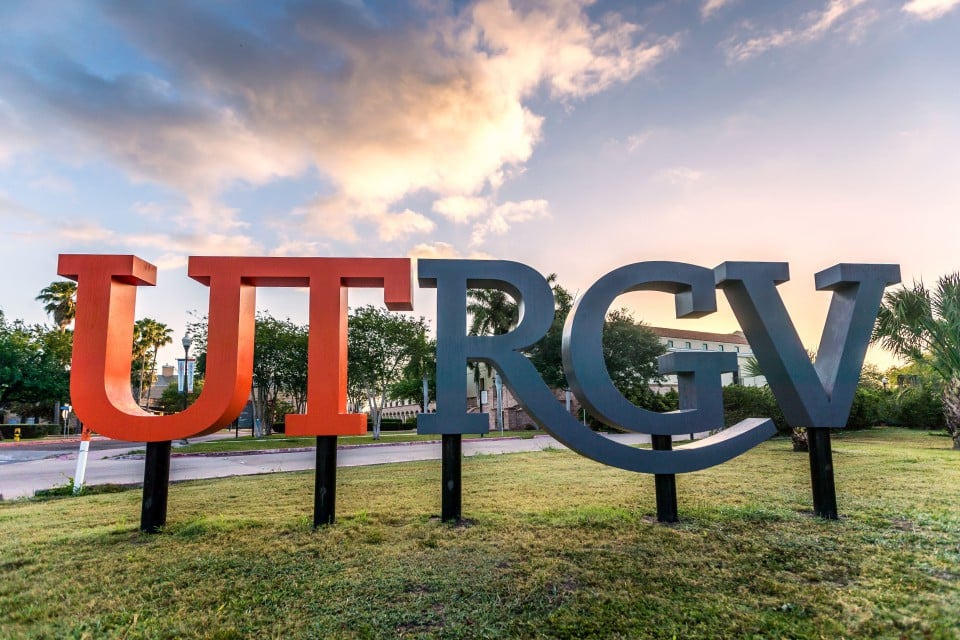
(UTRGV Archive Photo by David Pike)
News Release | Awards & Grants

(UTRGV Archive Photo by David Pike)
Friday, May 10, 2019
Announcements, Community
By News and Internal Communications
By Kelli Quin
RIO GRANDE VALLEY, TEXAS – The Texas Bar Foundation has awarded funding to UTRGV to improve college readiness among foster youth in the Rio Grande Valley.
The grant, entitled “Empowering Success for Foster Youth in South Texas,” promotes self-advocacy, high school completion and college-mindedness among foster children and those involved with the Child Protection Court.
The program will be led by Dr. Cynthia Jones, UTRGV associate professor of philosophy and ethics and director of the university’s Office for Victim Advocacy & Violence Prevention. And it will be administered by the newly formed Coalition for Empowering Children and Families (CECF) in Hidalgo and Starr Counties – a collaboration between professionals who serve foster youth, professionals associated with CPC, local stakeholders, and the UTRGV Office for Victim Advocacy & Violence Prevention.
“The hope is that we can empower children who are involved with the Child Protection Court to advocate for themselves, and to improve their self-esteem and their educational outcomes,” Jones said. “We want to encourage them to finish high school and pursue post-secondary education.”
The program first will use focus groups to seek information from current college students who were part of the foster system, relying on positive role-modeling and outreach strategies to encourage youth with empowering messaging. The program aims to provide a friendlier space for foster youth when they attend court, where they will have access to a mentor, books and videos that promote educational achievement; and where they can hear stories shared by foster youth at UTRGV and other post-secondary schools. The books given to children when they leave court will contain bookmarks with positive affirmations to further reinforce the program’s messages.
By involving students currently at UTRGV, as well as from other area schools like South Texas College and Texas State Technical College, who were part of the foster system, the program is designed to provide genuine, positive role models.
CHANGING THE FOSTER CARE EXPERIENCE
In the United States, more than 600,000 children and teenagers experience foster care. These children, and those who become involved with the Child Protection Court, often report lower confidence and self-worth, and are at a greater risk of experiencing poor life outcomes than other children.
For example, 25 percent of teens who age out of the foster system will become homeless. And more than one-third of teenage boys in the foster system will be incarcerated before the age of 21. One leveling factor demonstrated to reduce these inequities is educational achievement. Unfortunately, many foster youth experience extreme challenges and setbacks to their education.
Previous studies show that issues frequently experienced by foster youth – like frequent school changes, repeating a grade – are strong indicators of increased dropout rates. Foster youth have higher rates of special education needs, demonstrated behavioral problems in the classroom, and much higher rates of school expulsions and suspensions. While approximately 90 percent of the U.S. population age 25 and older complete high school, and 30 percent earn a bachelor’s degree, fewer than half of foster youths graduate from high school and only 2 percent earn a degree from a four-year college. Foster youth frequently lack the support system and positive role models that contribute to academic success, leading them to be less prepared for post-secondary education environments.
To mitigate those outcomes, UTRGV has developed its “Empowering Success for Foster Youth in South Texas” program to address disempowerment issues and impress upon foster youth, and children involved with CPC, the importance of graduating from high school and pursuing post-secondary education.
“Working with these children early is crucial to ensuring that they understand and believe that college is the next step and that they can succeed,” said the Honorable Carlos Villalon Jr., associate judge for the Child Protection Court of the Rio Grande Valley West. “More importantly, working with them in a manner that they can relate to is paramount.”
The UTRGVC grant provided by the Texas Bar Foundation will allow the CECF to purchase supplies and formalize materials needed for the program, such as developing engaging videos to address issues of self-esteem and college-mindedness; design print materials to distribute to the youth that encourages and empower them to pursue continued education; and solicit donated materials (e.g., books) from the community at large.
For more information about the Coalition for Empowering Children and Families in Hidalgo and Starr Counties, contact Jones at cynthia.jones@utrgv.edu.
ABOUT THE TEXAS BAR FOUNDATION
Since its inception in 1965, the Texas Bar Foundation has awarded more than $20 million in grants to law-related programs. Supported by members of the State Bar of Texas, the Texas Bar Foundation is the nation's largest charitably-funded bar foundation.
ABOUT UTRGV
The University of Texas Rio Grande Valley (UTRGV) was created by the Texas Legislature in 2013 as the first major public university of the 21st century in Texas. This transformative initiative provided the opportunity to expand educational opportunities in the Rio Grande Valley, including a new School of Medicine and a School of Podiatry, and made it possible for residents of the region to benefit from the Permanent University Fund – a public endowment contributing support to the University of Texas System and other institutions.
UTRGV has campuses and off-campus research and teaching sites throughout the Rio Grande Valley including Brownsville (formerly The University of Texas at Brownsville campus), Edinburg (formerly The University of Texas-Pan American campus), Harlingen, Weslaco, McAllen, Port Isabel, Rio Grande City and South Padre Island. UTRGV, a comprehensive academic institution, enrolled its first class in the fall of 2015; the School of Medicine welcomed its first class in the summer of 2016, and the School of Podiatric Medicine in the fall of 2022.